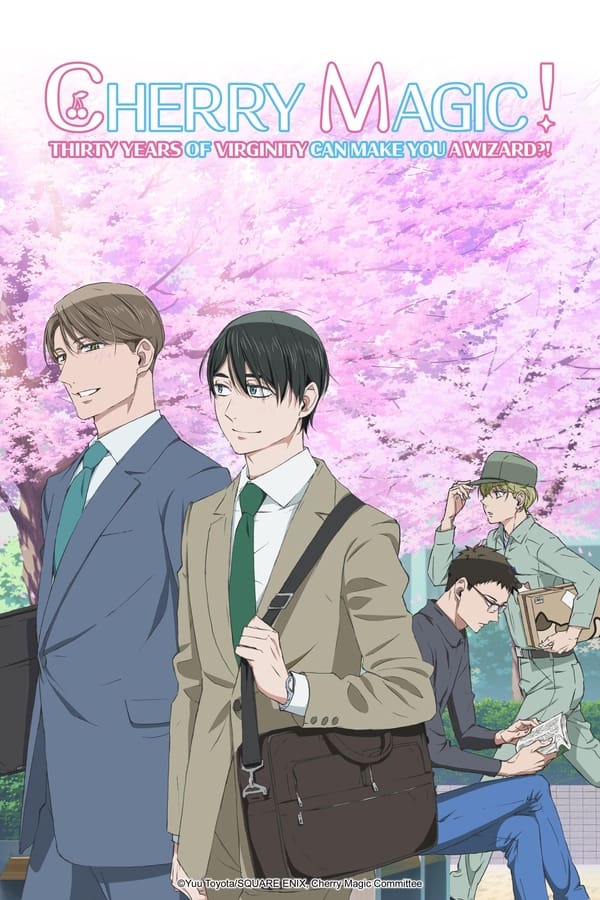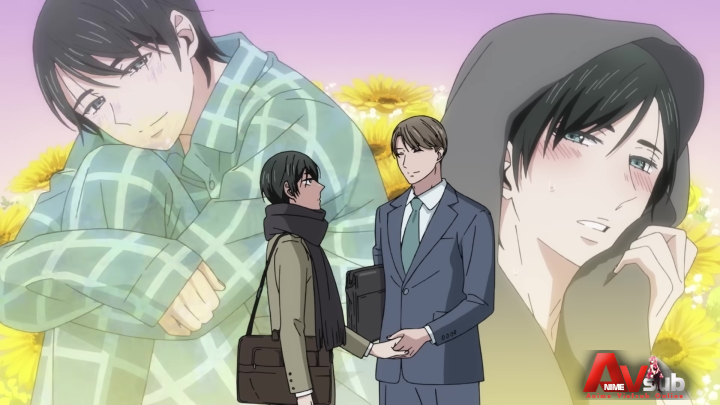Magic Cherry! Can You Become a Wizard After Thirty Years of Virginity? It’s like My New Boss Is Gay, but Actually Goofy.
Although there are clear parallels between the two, not the least of which is that they both focus on the relationships between men who work for the same organization, it would be simple to dismiss this series in that manner. However, Cherry Magic is obviously a romance novel, with the developing love between Adachi and Kurosawa serving as the main plot point. There’s also a bonus side romance between Tsuge, Adachi’s college classmate, and Minato, a younger dancer/delivery man. If you can look past the absurd show name, you’ll find that the characters are all mature and behave accordingly. For fans of the genre, it’s a delightful treat, and for those who aren’t, it’s a great place to start.

The idea behind the story is simple yet rather uncomfortable: businessman Adachi finds out he has the power to read people’s minds on the morning of his thirtyth birthday. Understandably, he’s a little spooked out, as he believes this is proof that the urban legend about thirty years of virginity conferring wizardly powers is true. When he discovers that someone is in love with him in a packed elevator at work, things become even crazier. … it’s the incredibly attractive and gifted Kurosawa, whom Adachi has hardly ever seen. Totally taken aback by the disclosure, Adachi starts to pay more attention to how he interacts with the other man and, in the process, finds himself falling in love.
This makes it possible to view the story’s central myth—that being able to read minds after a certain amount of virginity—in a more complex way. Though it doesn’t seem like it at first, the story is subtly addressing the notions that sex is by no means a prerequisite for a fulfilling life and that virginity is a social construct because Adachi hardly ever gets into bed with Kurosawa right away. In fact, Kurosawa never even brings up the subject of sex as something he wants or is pressuring Adachi to have with him. Though it’s obvious that he would prefer to sleep with the other man, he acts with such respect that he waits for Adachi to initiate contact and is happy to go at his own speed. When you consider their whole connection, it appears that the magic is more of a ruse to make it easier for someone who would desire to find love to find it. Adachi couldn’t move forward in his romantic life until he came to the realization that someone loved him, and magic was what made that possible for him to comprehend. The same is true for Tsuge, who is in a comparable circumstance; they are both actively seeking love but are unable to locate it. Of course, there are problems with this hypothesis. Still, it’s a pleasant approach to consider the fundamental concepts of the novel, which boil down to the notions that there’s always someone out there for you and that a romantic relationship based on respect is ideal.
A major story point is that notion of mutual respect. Adachi and Kurosawa don’t let miscommunications fester or mount up between them; instead, they communicate with one another about what is and isn’t working for them. This is about real adults acting like adults, not about teenagers in adult bodies. Since they’re still only human, problems will inevitably come up. For example, Kurosawa feels cheated when Adachi doesn’t discuss a possible promotion with him; nevertheless, this should only serve as fodder for discussion rather than cause for a tantrum or threats of separation. The plot has suspense, but it avoids melodrama, which is not something you can say about many other works in the same genre. On the Tsuge/Minato side, things are a little more tense, but that makes sense given the differences between the two couples: Tsuge is seven years older than Minato, and their primary source of communication is Tsuge’s cat, Udon. Given their similar ages and same workplace, Adachi and Kurosawa inevitably have more points of reference in common.
Manga readers will notice that, for the most part, the anime sticks to Yū Toyota’s book plot, albeit with some rearranging of the Tsuge portions and careful use of the time skip in the last episode to bring everything together in the most satisfying way possible. While Udon and Minato suffer a little bit, Toyota’s simple lines are mainly carried over to the anime character designs. Nevertheless, the animation as a whole is unimpressive. It’s quite mediocre visually, with the color scheme’s love of brown tones not helping the production in any way. However, there are moments when it needs to be closer to perfection and succeeds. Fortunately, the voice acting is superb, especially Chiaki Kobayashi’s and Ryōta Suzuki’s respective roles as Kurosawa and Adachi. Suzuki deserves a lot of praise for his interpretation of Kurosawa’s internal music, particularly for the truly amazing “First Date with Adachi” song.
Cherry Magic is a gentle, low-key tale of two people finding happiness and falling in love. It avoids a lot of the BL clichés, seeming more like a traditional genre romance than something more tightly classified into a certain subgenre, and at the conclusion of the series, it simply makes you grin. Though it should look better, don’t let that deter you from enjoying this thoughtful, well-adjusted romance.



